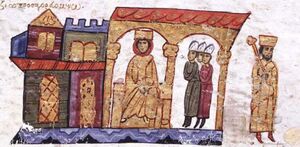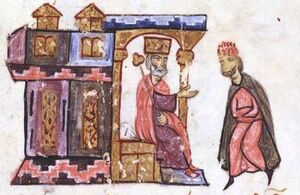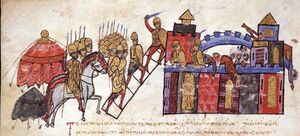John I
“You're not my type Theophano”
Emperor John I betrayed his wife, his lover, his uncle and best friend, the people that killed his uncle and best friend, tricking a bunch of Germans looking for an imperial bride and yet...was an excellent general who won his battles. In otherwords, acting like a complete shit got John to places. Indeed, his original home town in what is now Turkey still carries his name (Cemisgezek) and there are streets in Greece named after him[1].
Background[edit]
To give him his full name, John Tzimiskes was born in around 925. His family were of Armenian origin. He owed his success to a judicial marriage into Byzantine military aristocracy and in particular, his friendship with his uncle and the future emperor Nikephoros II. Unlike the smooth and immaculately dressed John, Nikephoros was a very able general but a bit of slob in social gatherings.
As Nikephoros's military repuation rose, so did it help John's career fortunes. In 963 following the suspicious death of emperor Romanos II, Nikephoros had become co-emperor/protector of the very young Basil II and his brother Constantine VIII. After a short struggle, the dowager empress Theophano had won power against opposition and had chose Nikephoros as her new husband. This hadn't been a love match, Theophano wanted protection. Perhaps from herself too as she gained a reputation for killing Byzantine rulers of late.
Ruler of the East[edit]
Nikephoros had installed John as his supreme commander of the armies in the East. This essentially meant a regular battle with the various Arabic states along the border. In the past this had been the sort of command that had seen regular Byzantine disasters but in this time period it was the Arabs that were the weaker. The frontier had been extended and the Byzantine armies were crossing into Syria and Lebanon.
John was obliged to make regular reports and to travel back to Constantinople for an annual loyalty oath to his emperor. John's first wife Maria Skleraina died around this time, whether through natural causes or one of Theophano's 'Fatal Cocktails' is not known. This is possible as around this time Theophano was already bed hopping with John whilst her husband Nikephoros was away. To say this was a risky policy is an understatement. Byzantine politics involved plenty of front and back stabbing (often literally). It was becoming risky for them both.
In around 968 John lost his command in the east. Nikephoros didn't know anything about the affair between Theophano and John as he ordered John back to the capital. Theophano had meanwhile had been aware that her husband had added a few more generals to his 'to cut off the head' list. It was time to make a murderous move.
In December 969 whilst Nikephoros was sleeping off the effects a giant bender with his remaining cronies, Theophano unlocked the imperial bedchamber and sneaked off to her own room. In came a posse of killers who overwhelmed Nikephoros and killed him. Theophano then slipped back into the room to greet her lover but was surprised to see that John wasn't with the gang. He had made an excuse about a headache and had made sure he was far away from the murder scene. Puzzled, Theophano checked that her sons were still alive and ordered a search for the slippery John. She eventually found John with her sons Basil and Constantine and with the Patriarch of Constantinople in the Hagia Sophia. John had sneaked off to get himself crowned. John was now officialy a co-emperor. The official story was that Nikephoros had been thinking of going solo and had died via the wrath of God and some sharp knives.
Emperor and a new wife[edit]
John was now emperor. Theophano had imagined she would 'legitimise' that advancement with a new marriage (her third). To her immense surprise John insisted that they both do penance for their previous relationship (not conspiring to kill his predecessor) and that in anyway, it was her fault as according to Church doctrine about instigating their long running affair. Theophano was ejected from court and parked in a suitable convent afterwards. Basil and Constantine agreed to effectively exile their own mother[2].
With Theophano safely banished John's immediate problem was going to be the Phokas family. Nikephoros's nephew Bardas Phokas (and therefore John's cousin) took the news of his uncle's death badly by declaring himself emperor. Bardas was defeated and exiled to an island, a mild punishment for a loser when mutilation or a nasty death was the usual fate of rebel. Further on John also exiled his former friends who had killed Nikephoros so to appear he was acting 'even handedly'[3].
After all this upheavel John thought he should be able to marry again. He would choose a woman who had led a life in complete contrast to Theophano. His choice fell on the Byzantine princess-turned-nun Theodora. She was the daughter of Constantine VII who along with her four sisters and mother had been effectively locked away in a nunnery by her brother emperor Romanos II. This had been the work of Theophano who was jealous of all her sisters-in-law. Why John chose Theodora over her four other sisters isn't known. Perhaps she was the dullest and in contrast to Theophano, unlikely to kill him.
Bulgarians and Russians[edit]
Relations between the Bulgarians and Byzantines had been more or less cordial since the 920s with a few skirmishes now and again. The Bulgarians had joined the Orthodox christian club rather than the rival Catholic christian one. The Bulgars had created their own empire in the Balkans and had intermarried with the Lekapeni family of Romanos I. This meant their current ruling emperor Boris was the second cousin of Basil and Constantine.
The Russians on the other hand had remained pagan had already twice tried a naval raid on Constantinople. They also despised the Bulgarians for giving up their original religion to follow some guy who died in a place they had never heard of. The Russians followed spirits, mainly vodka inspired. Their leaders had originally been Swedish vikings who had stayed and created tribal 'states'. They were also very blond(e) and loved tennis.
Learning that Boris was actually taking a holiday in Constantinople, the Russia horde crossed the Danube and pushed aside local resistance. Boris asked for Byzantine help. The Russians were brave but stupid and fell into a clever Byzantine trap. Their leader Sviatoslav got stuck in a fortress and was besieged by emperor John. They could have been all killed by John was ready to negotiate. The Russians crossed back over the Danube and were rewarded with some new clothes and shoes to stay out of the empire. Sviatoslav was given a horse. He and John shook hands as eternal friends. When Sviatoslav left John sent a note to his enemies on the route back home giving times, dates and stopovers. Sviatoslav was killed.
The Bulgarians were initially pleased to see the back of the Russians. John rewarded Boris by insisting abdicate, hand over his country to the Byzantines and take up permanent residence in the imperial palace. It was that or death. Boris chose the former. Not all Bulgarian princes and dukes were ready to roll over. They resisted but were forced to leave Eastern Bulgaria and move further west.
Tricking the Germans[edit]
No sooner than John was back in Constantinople than a new embassy from the Holy Roman Empire. The German emperor Otto the Great was still after a Fat Greek Wedding and an alliance against the Saracen raiders in Southern Italy. The previous attempt had been up ended by Nikephoros who objected to be called a 'Greek Emperor' and had thrown out his Western European visitors[4]. This time the embassy were seeking a bride for Otto's son Otto Jnr.
Emperor John was no more enamoured by these whiffy Germans who ate with their hands, wiped their hands on their tunics and bathed about once a year than Nikephoros. These Westerners also appeared a bit dim as their only orders were to 'find a Greek princess' without being specific. John was in mind to have an alliance with the Germans but the only imperial princesses available would either be his wife's remaining sisters or Anna, the 10 year old sister of Basil and Constantine. However John did have a niece called Theophano who was about the right age for Otto junior. He said she was his 'niece' without being specific. The Germans presumably thought that (a) she was another sister of the junior emperors and named after her infamous mother and (b) therefore John's niece via his marriage to Theodora, the sister of Romanos II and therefore Theophano's aunt. The German embassy was delighted when John gave his assent to the marriage (and presumably rubber stamped by the junior emperors too)[5].
The embassy returned to Otto with the prized princess. It was only then that the deception was revealed. Whether someone blabbed or Theophano herself confessed to her true origins to Otto isn't known. Emperor Otto was minded to send Theophano straight back to Constantinople with a 'rejection note'. However this would involved time wasted and he wanted to see his son married before he died. Theophano stayed. Later on emperor Basil II would tell Otto II that the trick was John's switcheroo scheme.
Out East[edit]
John began to hope. With his recent run of success would it be possible to give the Eastern frontier a new push back. Byzantine armies had already re-taken Antioch and Cyprus. The Abbasid Caliphate was breaking apart. They had just lost Egypt to a rival family known as the Fatimids. Not only had they claimed they were the true Caliphate but were Shiites too which meant the Fatimids were both a political and a religious enemy. In fact, worse than the Christian Byzantines.
John's armies swept into Syria capturing cities like Damascus. The chance to enter Jerusalem and 'restore' the long lost lands seemed possible. The emperor chose to return home. Ever cautious, he had rumours of rebellion from the Phokas family again and the possible involvement of Basil Lekapenos in the scheme[6].
Death[edit]
John went back to Syria for another campaign. Jerusalem remained unconquered (or re-unconquered if you were a Christian) but plenty of other booty was seized. On the way back to Constantinople John suddenly died. It's possible he was murdered or drank something he shouldn't. Did the jilted Theophano kill her fifth emperor or had she encouraged Basil Lekapenos to do it? Who ever was behind it John was gone.
References[edit]
- ↑ A rare example of Greeks and Turks agreeing that John Tzimiskes was someone to celebrate
- ↑ This had been done before earlier in the century when Constantine VII had done the same to his mother Zoe, though the latter hadn't been involved in the murder of four emperors!
- ↑ The assassins got off lightly. They avoided the usual eye gouging and limb removal as well.
- ↑ This may seem odd as the Byzantines used the Greek alphabet and spoke that language. However in their eyes they were the Romans who had shifted the empire eastwards
- ↑ Theophano's actual parentage isn't known. She may have been related to John's first wife
- ↑ Basil Lekapenos was a bastard son of emperor Romanos I and therefore the half brother of two other emperors Stephanos and Constantine Lekapenos. Basil was an adept survivor of palace politics.
| Preceded by: Nikephoros II |
Byzantine Emperor 969–976 |
Succeeded by: Basil II and Constantine VIII |





